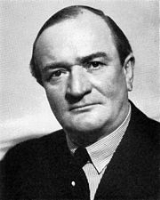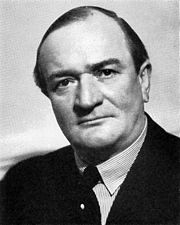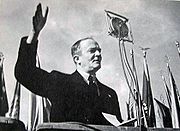
Gustav Möller
Encyclopedia
- For the Swedish track and field athlete, see Gustav Möller (athlete)Gustav Möller (athlete)Gustav Möller was a Swedish track and field athlete who competed in the 1912 Summer Olympics.In 1912 he was eliminated in the first round of the 200 metres competition as well as of the 400 metres event....
; for the American painter, see Gustave MoellerGustave MoellerGustave Moeller was an American-born artist who was most well known for painting, especially painting American towns and villages. Moeller was born in New Holstein, Wisconsin, but moved to Milwaukee at a young age. As a teen Moeller attended the Milwaukee Art Students’ League with young artists...
.


Sweden
Sweden , officially the Kingdom of Sweden , is a Nordic country on the Scandinavian Peninsula in Northern Europe. Sweden borders with Norway and Finland and is connected to Denmark by a bridge-tunnel across the Öresund....
Social democratic
Swedish Social Democratic Party
The Swedish Social Democratic Workers' Party, , contesting elections as 'the Workers' Party – the Social Democrats' , or sometimes referred to just as 'the Social Democrats' and most commonly as Sossarna ; is the oldest and largest political party in Sweden. The party was founded in 1889...
politician, credited as the father of the social security system and the Welfare state
Welfare state
A welfare state is a "concept of government in which the state plays a key role in the protection and promotion of the economic and social well-being of its citizens. It is based on the principles of equality of opportunity, equitable distribution of wealth, and public responsibility for those...
, called Folkhemmet
Folkhemmet
Folkhemmet is a political concept that played an important role in the history of the Swedish Social Democratic Party and the Swedish welfare state. It is also sometimes used to refer to the long period between 1932-76 when the Social democrats were in power and the concept was put into practice...
. He was a Member of Parliament in 1918-1954 and Member of the Government in 1924-26, 1932–36 and 1936-51.
Life and career
Gustav Möller was born in 1884 to a poor family in MalmöMalmö
Malmö , in the southernmost province of Scania, is the third most populous city in Sweden, after Stockholm and Gothenburg.Malmö is the seat of Malmö Municipality and the capital of Skåne County...
, Sweden
Sweden
Sweden , officially the Kingdom of Sweden , is a Nordic country on the Scandinavian Peninsula in Northern Europe. Sweden borders with Norway and Finland and is connected to Denmark by a bridge-tunnel across the Öresund....
, but was discovered by his employer and given an education as an office accountant; however he used it in the service of the labour movement, initially as a leader of its publishing house.
Minister of Social Affairs 1936-38 and 1939-51 he is credited as the creator of the Swedish social security system and the Welfare state
Welfare state
A welfare state is a "concept of government in which the state plays a key role in the protection and promotion of the economic and social well-being of its citizens. It is based on the principles of equality of opportunity, equitable distribution of wealth, and public responsibility for those...
called Folkhemmet
Folkhemmet
Folkhemmet is a political concept that played an important role in the history of the Swedish Social Democratic Party and the Swedish welfare state. It is also sometimes used to refer to the long period between 1932-76 when the Social democrats were in power and the concept was put into practice...
. He was influenced by Alva Myrdal
Alva Myrdal
Alva Myrdal was a Swedish sociologist and politician. She received the Nobel Peace Prize in 1982. She married Gunnar Myrdal in 1924....
and Gunnar Myrdal
Gunnar Myrdal
Karl Gunnar Myrdal was a Swedish Nobel Laureate economist, sociologist, and politician. In 1974, he received the Nobel Memorial Prize in Economic Sciences with Friedrich Hayek for "their pioneering work in the theory of money and economic fluctuations and for their penetrating analysis of the...
's ideas about policies which could help families.
There were two specifics about Möller's welfare policy, coloured by his experiences in childhood:
1. There should be no stigmatization of the poor, no sorting out of those in need. Rich families as well as poor should have their children's allowance, old age pension and free medical treatment.
2. There should be as little bureaucratic paternalism and arbitrariness as possible. Preferably, the welfare assignments should be administered by the recipients themselves, as when unemployment allowances were administered by the trade unions. And allowances should always be cash.
Möller considered the welfare state a temporary stopgap rather than a goal in itself. A dedicated Socialist, he resigned from government in 1951 rather than following his party into post-war compromises with private business.
He lived in Stockholm
Stockholm
Stockholm is the capital and the largest city of Sweden and constitutes the most populated urban area in Scandinavia. Stockholm is the most populous city in Sweden, with a population of 851,155 in the municipality , 1.37 million in the urban area , and around 2.1 million in the metropolitan area...
at the time of his death in 1970.

